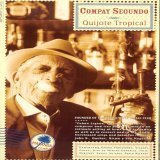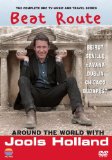![Buena Vista Social Club [1999]](/pictures/1032317.jpg) Buena Vista Social Club | DVD | (16/06/2003)
from £4.80
| Saving you £5.19 (108.12%)
| RRP
Buena Vista Social Club | DVD | (16/06/2003)
from £4.80
| Saving you £5.19 (108.12%)
| RRP In 1996 Ry Cooder gathered together some of the greatest names from the history of Cuban music to collaborate on the best selling and Grammy winning album The Buena Vista Social Club.
![Buena Vista Social Club [1999]](/pictures/1090219.jpg) Buena Vista Social Club | DVD | (26/01/2009)
from £7.74
| Saving you £9.51 (146.76%)
| RRP
Buena Vista Social Club | DVD | (26/01/2009)
from £7.74
| Saving you £9.51 (146.76%)
| RRP In 1996 Ry Cooder gathered together some of the greatest names from the history of Cuban music to collaborate on the best selling and Grammy winning album The Buena Vista Social Club.
![Buena Vista Social Club [Blu-ray]](/pictures/1160428.jpg) Buena Vista Social Club | Blu Ray | (22/08/2022)
from £11.98
| Saving you £N/A (N/A%)
| RRP
Buena Vista Social Club | Blu Ray | (22/08/2022)
from £11.98
| Saving you £N/A (N/A%)
| RRP Wim Wenders' recording of the Cuban all-stars band helped introduce the world to these consummately gifted and charismatic performers. In 1996, Ry Cooder helped bring together a group of legendary Cuban musicians under the banner of Buena Vista Social Club, the name of a popular 1940s members bar in the Buenavista quarter of Havana. Amongst the performers were guitarist and singer Compay Segundo, pianist Rúben Gonzalez, singer Ibrahim Ferrer, singer and guitarist Eliades Ochoa and singer Omara Portuondo. Their eponymous album, released in 1997, was a huge hit. On the announcement of a world tour, Wenders joined the band, recording them in concert. Cooder had previously worked with Wenders on the evocative score for the director's 1984 road movie Paris, Texas. Here, Wenders intersperses his record of the concerts with personal reminiscences by the band of their early years as musicians and performers in Batistsa's pre-revolutionary Cuba and what life was like under Castro's regime. What emerges is a riveting combination of music by a veteran band still at the top of their game and a fascinating personal insight into the history of a country.
![Afro-Cuban Legends [2001]](/pictures/1027424.jpg) Afro-Cuban Legends | DVD | (01/08/2001)
from £21.02
| Saving you £-8.03 (-61.80%)
| RRP
Afro-Cuban Legends | DVD | (01/08/2001)
from £21.02
| Saving you £-8.03 (-61.80%)
| RRP With no apparent let up in the fascination for all things musically Cuban, Afro-Cuban Legends is a rather uneven but ultimately fascinating examination of the phenomenon. The first half, a 1998 South Bank Show documentary about the Afro-Cuban All Stars is wonderful, telling the story of young band leader Juan de Marcos Gonzáles and his efforts to reunite some of the stars of the golden age of Cuban music. The film works as much as travelogue as music documentary, painting a poignant portrait of a grand old city in decline--quite the opposite story of the musicians involved. Ibrahim Ferrer, Rubén González and Pio Leyva are all elderly artists who, having assumed that their moment had past, are clearly enjoying a second time in the sun. The story of their revival is both moving and inspiring (one of the best moments comes as Ferrer and González drive round Havana in an open topped car, raging about the US and its bully-boy tactics) and achieves that rare feat--a documentary that holds the interest whether or not the viewer is an aficionado of the music. The second half, a live concert recording of Company Segundo, is not quite so vital. A rather shaky television recording, the music lacks the spark and vitality of the Afro-Cuban All Stars and is strictly second division Cuban material. On the DVD: Chapter selection, a range of subtitles and a Web link are all that is on offer by the way of extras. Given that both programmes were made for television, the picture quality is not big budget standard. The South Bank Show is, however, beautifully shot and the DVD format makes the most of the impressive settings, both natural and architectural. The sound quality is crisp and clear, perfect for the series of musical performances. The Company Segundo segment suffers from the original's lack of production values, although the sound track is equally vibrant. --Phil Udell
 Compay Segundo - Quijote Tropical | DVD | (04/12/2006)
from £13.59
| Saving you £1.40 (9.30%)
| RRP
Compay Segundo - Quijote Tropical | DVD | (04/12/2006)
from £13.59
| Saving you £1.40 (9.30%)
| RRP Compay Segundo - Quijote Tropical [Spanish Import]
 Jools Holland - Beat Route | DVD | (22/09/2008)
from £N/A
| Saving you £N/A (N/A%)
| RRP
Jools Holland - Beat Route | DVD | (22/09/2008)
from £N/A
| Saving you £N/A (N/A%)
| RRP Beirut Seville Havana Dublin Chicago Budapest: This three-hour DVD presentation of the complete BBC TV series Beat Route takes top music television presenter Jools Holland (The Tube Later with Jools Holland) and places him in six colourful major cities around the world to delve 'under the skin' of each location. The result is a stunning mix of music travel and culture with each city revealed through Jools' inimitable wit and personality. Jools meets many celebrated musicians listens to their music and jams with the best of them. From the urban blues of Chicago the flamenco of Seville and the folklore of Budapest to the riverside bars of Dublin 1950s Cadillacs in Havana and girl bands in Beirut Beat Route paints a vivid and engrossing picture of urban identity. Whether it's a brief encounter with a dating agency run out of the back of a Chicago cab or a musical collaboration in an old square in Havana Beat Route pays homage to some of the world's most fascinating and diverse locations. Beat Route was first broadcast on BBC 2 in December 1998/January 1999
![Compay Segundo - A Cuban Legend [2002]](/pictures/1067477.jpg) Compay Segundo - A Cuban Legend | DVD | (11/09/2006)
from £N/A
| Saving you £N/A (N/A%)
| RRP
Compay Segundo - A Cuban Legend | DVD | (11/09/2006)
from £N/A
| Saving you £N/A (N/A%)
| RRP Music revolution tobacco rum and women... this is the stuff of Cuba and star of the Buena Vista Social Club Compay Segundo embodies them all as he embodies Cuba itself. A former cigar-roller Segundo has been a integral part of Cuba's musical history for over 70 years. And as such he is justly regarded internationally as a legend. Director Claude Santiago treats us to this 52min portrait of the man his music and his lasting influence on the landscape of Cuba's music politics and history. Bonus Concert Tracklist: 1. Yo Vengo 2. La Ternera 3. Sarandonga 4. El Camison de Pepa 5. Macusa 6. Sabroso 7. Chan Chan
![Compay Segundo - A Cuban Legend [2002]](/pictures/1027088.jpg) Compay Segundo - A Cuban Legend | DVD | (20/05/2002)
from £N/A
| Saving you £N/A (N/A%)
| RRP
Compay Segundo - A Cuban Legend | DVD | (20/05/2002)
from £N/A
| Saving you £N/A (N/A%)
| RRP Probably the last living legend of Cuban Music Compay Segundo has expanded international popularity of Cuban music for over 70 years with music that is a collage of the world's impression of Cuba it's music revolution rum women and sunshine. In this superb portrait of the man and his music Compay Segundo reveals a century of cuban music and politics. Track Listing: 'Yo Vengo Aqui' 'La Ternera' 'Sarandonga' 'El Camison De Pepa' 'Macusa' 'Sabrosa' and 'Chan Chan'.
![Buena Vista Social Club [1999]](/pictures/1074197.jpg) Buena Vista Social Club | DVD | (17/09/2007)
from £6.45
| Saving you £9.54 (147.91%)
| RRP
Buena Vista Social Club | DVD | (17/09/2007)
from £6.45
| Saving you £9.54 (147.91%)
| RRP In 1996 Ry Cooder gathered together some of the greatest names from the history of Cuban music to collaborate on the best selling and Grammy winning album The Buena Vista Social Club.

Please wait. Loading...
This site uses cookies.
More details in our privacy policy